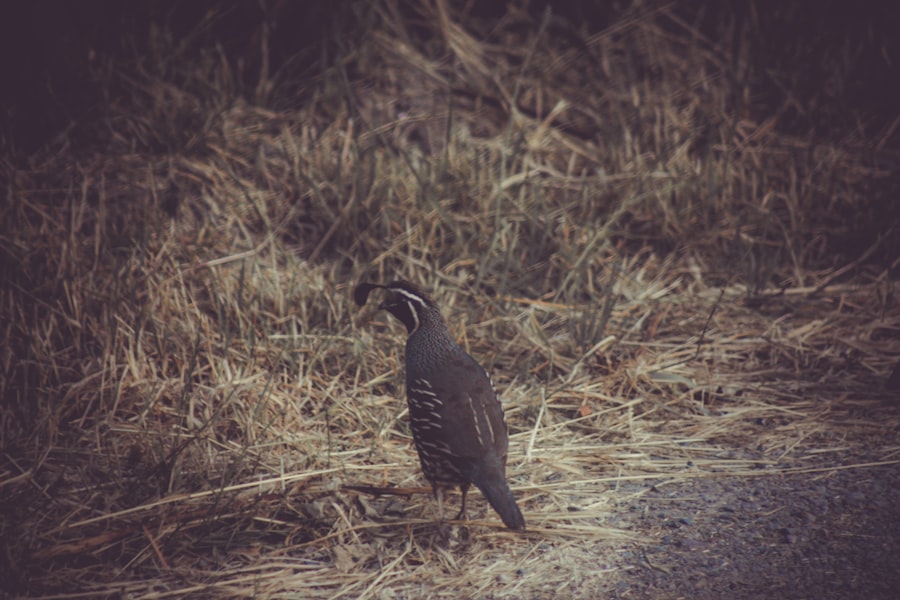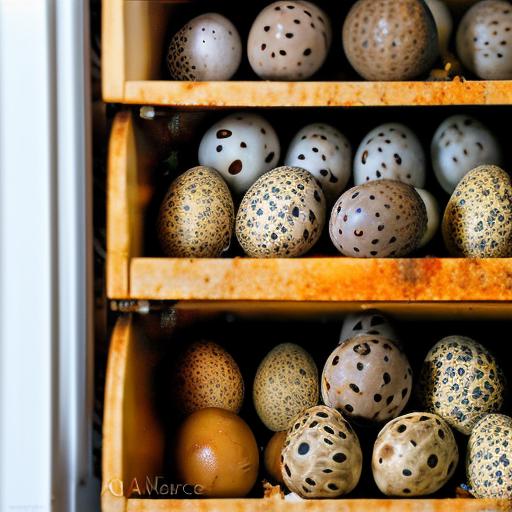Quail eggs are small, speckled eggs that come from the quail bird, a small game bird that is native to Europe, North Africa, and Asia. These eggs are gaining popularity in the culinary world due to their delicate flavor and high nutritional value. Quail eggs are packed with essential nutrients such as protein, vitamins, and minerals, making them a healthy addition to any diet. They are also known for their beautiful appearance, with a unique speckled pattern on the shell that adds an elegant touch to any dish. Quail eggs are commonly used in various cuisines around the world, from Asian dishes like sushi and ramen to European delicacies like Scotch eggs and canapés. Due to their small size, quail eggs are often used as a garnish or decorative element in dishes, adding a touch of sophistication to the presentation.
Quail eggs are also known for their versatility in cooking, as they can be prepared in numerous ways such as boiled, fried, pickled, or even used in baking. Their delicate flavor and creamy texture make them a favorite among chefs and home cooks alike. In addition to their culinary uses, quail eggs are also believed to have medicinal properties and are used in traditional medicine to treat various ailments. With their growing popularity and numerous health benefits, it’s important to understand how to properly store and handle quail eggs to ensure their freshness and safety for consumption.
Key Takeaways
- Quail eggs are small, nutritious eggs that are gaining popularity in the culinary world.
- Store quail eggs in the refrigerator at a consistent temperature and away from strong odors.
- Factors affecting the shelf life of quail eggs include temperature, humidity, and cleanliness.
- Signs of spoilage in quail eggs include changes in color, texture, and odor.
- Proper handling and storage of quail eggs is essential for maintaining their freshness and quality.
Storage Guidelines for Quail Eggs
Proper storage is crucial for maintaining the freshness and quality of quail eggs. When stored correctly, quail eggs can have a shelf life of up to 2-3 weeks. The ideal storage temperature for quail eggs is between 45-50°F (7-10°C). It’s important to store quail eggs in the refrigerator to prevent them from spoiling quickly. Quail eggs should be stored in their original carton or in an egg holder to prevent breakage and protect them from absorbing strong odors from other foods in the refrigerator.
It’s important to note that quail eggs should not be washed before storage, as they have a natural protective coating that helps to keep out bacteria and preserve their freshness. Washing quail eggs can remove this protective coating and make them more susceptible to spoilage. Additionally, it’s best to store quail eggs with the pointed end facing downward, as this can help to keep the yolk centered and prevent it from coming into contact with the air pocket inside the egg, which can cause it to deteriorate more quickly.
Factors Affecting the Shelf Life of Quail Eggs
Several factors can affect the shelf life of quail eggs, including temperature, humidity, and handling practices. Temperature is one of the most critical factors that can impact the freshness of quail eggs. Storing quail eggs at temperatures above 50°F (10°C) can cause them to spoil more quickly, as higher temperatures can promote bacterial growth and accelerate the breakdown of the egg’s quality. On the other hand, storing quail eggs at temperatures below 45°F (7°C) can cause the egg whites to become watery and the yolks to become thick and gummy.
Humidity is another important factor that can affect the shelf life of quail eggs. Excessive moisture can cause the eggs to spoil more quickly, while low humidity can cause the eggs to lose moisture and shrink, leading to a decrease in quality. Proper ventilation is also crucial for maintaining the freshness of quail eggs, as it helps to prevent the accumulation of moisture and reduce the risk of mold growth.
In addition to environmental factors, handling practices can also impact the shelf life of quail eggs. Rough handling or improper storage can cause the eggs to crack or break, increasing the risk of contamination and spoilage. It’s important to handle quail eggs with care and store them properly to ensure their quality and safety for consumption.
Signs of Spoilage in Quail Eggs
It’s essential to be able to recognize the signs of spoilage in quail eggs to ensure their safety for consumption. One of the most common signs of spoilage in quail eggs is a change in color or appearance. Spoiled quail eggs may have discolored or cloudy egg whites, or the yolks may appear flattened or discolored. Additionally, spoiled quail eggs may have an off-putting odor, indicating that they have begun to deteriorate.
Another sign of spoilage in quail eggs is the presence of mold or unusual growth on the shell or inside the egg. Mold growth can occur when quail eggs are exposed to excessive moisture or stored in a humid environment, leading to contamination and spoilage. It’s important to inspect quail eggs carefully before consuming them and discard any eggs that show signs of mold or unusual growth.
In some cases, spoiled quail eggs may also exhibit physical changes such as cracks or leaks in the shell. Cracked or leaking eggs should be discarded immediately, as they can pose a risk of contamination and foodborne illness. It’s crucial to handle quail eggs with care and inspect them regularly for any signs of spoilage to ensure their safety for consumption.
Proper Handling and Storage of Quail Eggs
Proper handling and storage are essential for maintaining the freshness and safety of quail eggs. When handling quail eggs, it’s important to use clean hands and utensils to prevent contamination. It’s best to handle quail eggs gently and avoid dropping or jostling them, as rough handling can cause the eggs to crack or break, increasing the risk of spoilage.
When storing quail eggs, it’s crucial to keep them refrigerated at all times to prevent them from spoiling quickly. Quail eggs should be stored in their original carton or in an egg holder to protect them from breakage and prevent them from absorbing strong odors from other foods in the refrigerator. It’s also important not to wash quail eggs before storage, as this can remove their natural protective coating and make them more susceptible to spoilage.
Proper ventilation is also crucial for maintaining the freshness of quail eggs. It’s best to store quail eggs in a well-ventilated area of the refrigerator to prevent the accumulation of moisture and reduce the risk of mold growth. Additionally, it’s important to store quail eggs with the pointed end facing downward to help keep the yolk centered and prevent it from coming into contact with the air pocket inside the egg, which can cause it to deteriorate more quickly.
Using Quail Eggs Beyond the Refrigeration Period

While proper refrigeration is essential for maintaining the freshness of quail eggs, there are also ways to use them beyond the refrigeration period. Pickling is a popular method for preserving quail eggs and extending their shelf life. Pickled quail eggs can be stored at room temperature for several months and are a delicious addition to salads, appetizers, and charcuterie boards.
Another way to use quail eggs beyond the refrigeration period is by freezing them. Quail eggs can be cracked into an ice cube tray and frozen for later use in cooking and baking. Frozen quail eggs can be used in omelets, frittatas, or baked goods, providing a convenient way to extend their shelf life and reduce food waste.
In addition to pickling and freezing, quail eggs can also be used in various preserved forms such as salt-cured or fermented. These preservation methods can help extend the shelf life of quail eggs and provide unique flavors for culinary creations.
Conclusion and Summary
In conclusion, quail eggs are a versatile and nutritious ingredient that is gaining popularity in the culinary world. Proper storage and handling are crucial for maintaining the freshness and safety of quail eggs. Storing quail eggs in the refrigerator at temperatures between 45-50°F (7-10°C) and handling them with care can help extend their shelf life and ensure their quality for consumption.
It’s important to be able to recognize the signs of spoilage in quail eggs, such as changes in color or appearance, off-putting odors, mold growth, or physical damage. By inspecting quail eggs regularly and discarding any that show signs of spoilage, consumers can ensure their safety when consuming them.
Beyond the refrigeration period, there are various methods for using quail eggs such as pickling, freezing, or preserving them in salt or fermentation. These methods provide convenient ways to extend the shelf life of quail eggs and reduce food waste while adding unique flavors to culinary creations.
Overall, understanding how to properly store, handle, and use quail eggs is essential for enjoying their delicate flavor and nutritional benefits while ensuring their safety for consumption. With proper care and attention, quail eggs can be a delightful addition to any dish and provide numerous culinary possibilities for chefs and home cooks alike.
Quail eggs are a delightful addition to any kitchen, but how long can you keep them in the fridge? If you’re curious about the lifespan of different types of eggs, you might also be interested in learning about the egg-laying habits of geese. Check out this fascinating article on how many eggs geese lay to discover more about these prolific egg producers. Understanding the laying patterns of various poultry can provide valuable insights for anyone interested in raising their own flock.
FAQs
How long can I keep quail eggs in the fridge?
Quail eggs can be kept in the fridge for up to 2-3 weeks.
How should I store quail eggs in the fridge?
Quail eggs should be stored in their original carton or in a covered container to prevent them from absorbing strong odors from other foods in the fridge.
Can I freeze quail eggs?
Yes, quail eggs can be frozen for up to 1-2 months. It is best to crack the eggs into a freezer-safe container and beat them lightly before freezing.
How can I tell if quail eggs have gone bad?
You can tell if quail eggs have gone bad by performing the float test. Place the eggs in a bowl of water – if they sink and lay flat on the bottom, they are fresh. If they stand upright or float, they are no longer fresh and should be discarded.
Can I eat quail eggs past the expiration date?
It is not recommended to eat quail eggs past the expiration date, as they may no longer be safe to consume. Always check for signs of spoilage before consuming quail eggs.
Meet Walter, the feathered-friend fanatic of Florida! Nestled in the sunshine state, Walter struts through life with his feathered companions, clucking his way to happiness. With a coop that’s fancier than a five-star hotel, he’s the Don Juan of the chicken world. When he’s not teaching his hens to do the cha-cha, you’ll find him in a heated debate with his prized rooster, Sir Clucks-a-Lot. Walter’s poultry passion is no yolk; he’s the sunny-side-up guy you never knew you needed in your flock of friends!







